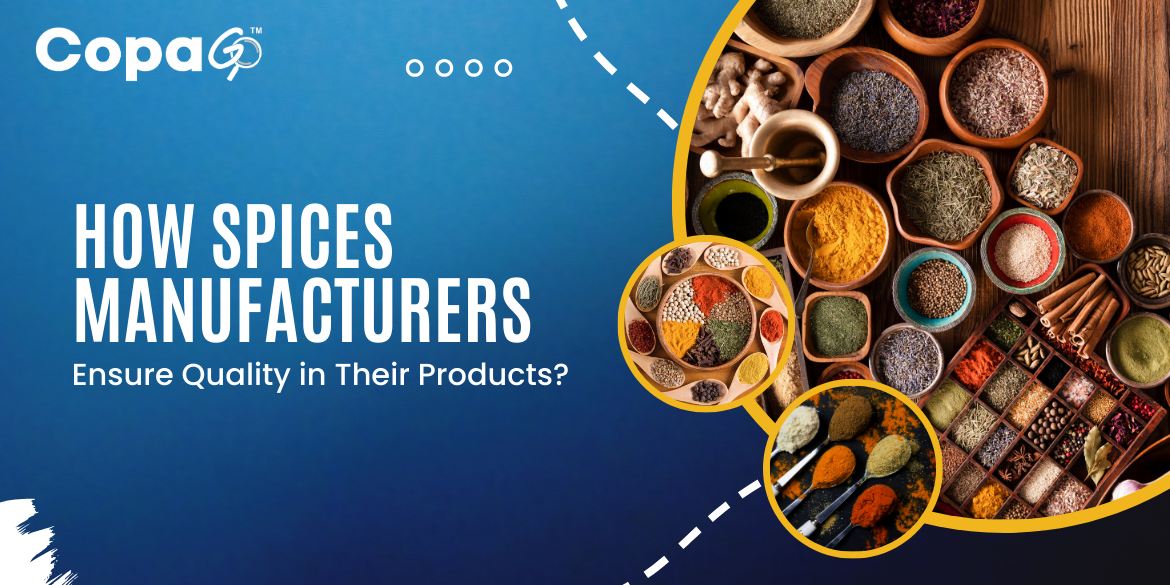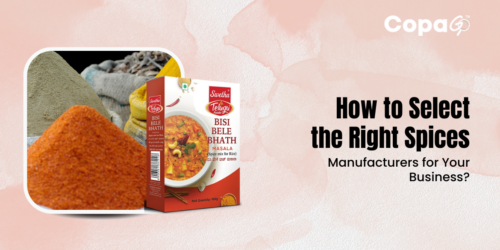Spices manufacturers play a crucial role in delivering the rich, vibrant flavors and delightful aromas that transform our meals. These are the spices that every kitchen needs: the hot bite of chili, the sweet aroma of cinnamon, and the golden warmth of turmeric.
But what guarantees that the spices we use are not only delicious but also of the highest caliber, secure, and beneficial to our health? Careful cultivation, accurate processing, and strict quality control are necessary for producing high-quality spices. Spices Manufacturers follow detailed processes to ensure each spice is pure, safe, and flavorful.
Key Steps Spices Manufacturers Take to Ensure Quality
Spices Manufacturers pay close attention to every detail, from the raw ingredients to the finished product, to guarantee premium spices. Here below are a few steps manufacturers take to ensure quality:
1. Sourcing the Best Raw Materials
Raw material sourcing is the first step in producing high-quality spices. India, renowned for its rich spice heritage, ensures that these materials come from trusted farms, carefully selected for their quality. Because of its diverse climates and soils, India produces a wide variety of high-quality spices, including sweet ones like aromatic cardamom and hot ones like chili.
Farmers regularly grow spices in the area, which is known for having fertile soil, guaranteeing a good harvest. In order to guarantee that the best quality spices are produced. Spices Manufacturers cultivate close ties with farmers and frequently advise them on the best agricultural methods.
2. Adhering to International Standards
In the very competitive global spice business, preserving premium quality is essential. Leading spice producers follow strict international standards that ensure food safety at every stage.
These guidelines include certifications such as ISO (International Organisation for Standardisation) and HACCP (Hazard Analysis Critical Control Point). By avoiding contamination and guaranteeing the safety and purity of the spices, these standards contribute to the development of consumer trust.
3. Strict Cleaning and Sorting Processes
Spices are carefully cleaned and sorted after harvest. This process is required to remove dirt, stones, and other undesired items. Only the highest-quality spices are packaged due to the use of advanced cleaning equipment, such as sieves and air classifiers.
Spices manufacturers from India are especially renowned for paying close attention to detail during this stage, ensuring that every spice is of the highest caliber before it is sold.
4. Drying and Grinding Techniques
The process of drying spices is sensitive. Spices manufacturers use controlled drying techniques, such as solar drying or mechanical dryers, because over-drying or under-drying may change the flavor and aroma.
Another important step is grinding, where manufacturers use high-quality mills to preserve the natural oils and flavors of the spices. To guarantee the proper texture and consistency, the grinding process is closely monitored.
5. Packaging with Care
Preserving the freshness, flavor, and scent of spices is more important than just packing them in a box. Spices manufacturers use packing materials that protect their products from moisture, light, and air, all of which might eventually lower the quality of the spices.
A lot of businesses are also using eco-friendly packaging to meet the rising demand for sustainable products. When spices are packaged properly, their shelf life is increased, and their integrity is preserved, guaranteeing that they are delivered to customers in optimal shape.
6. Quality Testing and Assurance
At every stage, from the raw material to the final product, quality testing is essential. Reputable spice producers have specialized labs where their products are put through strict safety, flavor, color, and fragrance examinations.
These tests guarantee that there are no contaminants, hazardous materials, or chemical residues in the spices. Customers may be sure that every batch of spices will provide the same superior experience because the consistency and authenticity of the flavor are carefully examined.
7. Traceability and Transparency
Customers are more aware than ever of what they eat in the modern world. Prominent producers of spices prioritize traceability, which allows them to monitor the whole process of their products from the farm to the packaging. Strong traceability systems can help manufacturers ensure transparency and build consumer trust.
Customers can be sure that their spices have been sourced and processed ethically if they have access to this information.
Read Also- How to Select the Right Spices Manufacturers for Your Business?
8. Innovation and Continuous Improvement
Spices manufacturers are constantly seeking innovative methods to enhance their goods.
Innovation is essential to preserving quality, whether it involves launching new varieties, experimenting with blends, or investigating improved processing methods.
Spices manufacturers from India also modify their goods in response to shifting client tastes, guaranteeing that their goods stay high-quality and current.
Final Thoughts
If it is about getting the best spices, finding the right spice manufacturers is an important factor. Copago Marketplace is an ideal place to get in touch with reliable spice manufacturers from India. Whether you are interested in high-quality spices or reliable suppliers, Copago makes all this easily accessible directly to the best.
The premium spice market is growing rapidly, and manufacturers are committed to providing safe, delicious, authentic, high-quality products. Copago Marketplace connects you with innovative, trusted suppliers who are perfect for finding what your business needs, giving your business a competitive advantage.
FAQs
1. What are the quality measures of spices?
Ans. Spices’ color, flavor, texture, moisture content, scent, purity, and lack of impurities like pesticides, heavy metals, or adulterants are all measured.
2. Does the quality of spices matter?
Ans. Yes, flavor, aroma, safety, and health benefits are all impacted by quality. Low-quality spices can affect the flavor and nutritional content of food by being less effective, polluted, or dangerous.
3. How do you test the purity of spices?
Ans. Methods such as chemical analysis, microscopy, and sensory evaluation (taste, smell) are used to test for purity. Authenticity is ensured by laboratory testing for ingredients, chemicals, and foreign substances.
4. How are spices manufactured?
Ans. Spices are cultivated, picked, cleaned, dried, ground, chopped, and packed. Techniques differ depending on the type of spice, but they all try to maintain flavor, color, and scent.
For more inquiries, please don’t hesitate to contact us!


